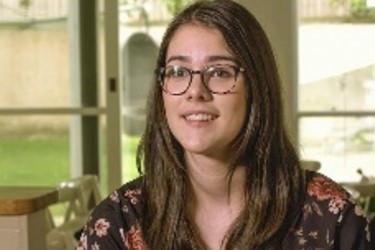Teen's Innovative Sticker Helps Solve Global Water Challenge

More than four million people today use sunlight to disinfect their water, but until recently there was no easy way to know exactly how much sunlight was needed. The winner of the 2019 Stockholm Junior Water Prize, Macinley Butson, invented a sticker that changes color when enough ultraviolet light has been received to kill bacteria and pathogens. The invention has the potential to make it easier and safer for millions of people to get clean water.
“The problem is that the World Health Organization recommendations are currently based on time,” says Macinley. “They say to expose the water from four to 48 hours, which as you can imagine is a very large gap with a lot of room for error. The UV exposure is affected by things like where in the world the person is located, if it’s sunny or cloudy, what season it is, and the altitude.”< /p>
Macinley’s invention, called the SODIS sticker, can be placed on or near plastic PET bottles filled with water to measure exactly how much UV light has been received. When the sticker changes from green to dark blue, the water is ready to use. The sticker costs less than a US penny to produce.
“My interest in water issues started when I was in year nine in geography class,” Macinley says. “World water issues are something that everyone knows about, but when I actually had to research it, I began to understand the true extent of the crisis we are facing. That really inspired me to use my passion for STEM (science, technology, engineering and mathematics) to try and help people out however I could.”
Macinley, from Australia and now 18 years old, has been inventing things since she was six.
“I like to solve problems that I see around me at the time, so my first project was a little self-indulgent, to be honest,” she says. “As a child I had this strange – and I can call it strange now – obsession with sunglasses. I think I had about 15 pairs of sunglasses by age six, and so of course there was this point when my mum said, ‘I’m not buying you anymore sunglasses, money doesn’t grow on trees.’ So, I turned around to her, I was very sassy at the time, and I said, ‘Well, if you’re not going to buy me some, I’ll make my own.’ And so I did.”
Six-year-old Macinley’s sunglasses included an extra feature. She attached two polarizers with magnets to the front of the sunglasses, so that you could turn them to adjust how dark they were. Since then she has created projects for radiotherapy for cancer treatment, delivering medicine for children, the efficiency of solar panels, and protecting gardens without using pesticides.
“Each one of those projects has been inspired by something that happened to either myself or something I saw in the world around me,” Macinley says. “At the time I thought, I’m going to try to dedicate myself to solve some component of that problem.”
This is the second time Macinely has been a finalist in the Stockholm Junior Water Prize. She won the Australian competition in 2017 for a self-sustaining water treatment unit. Using solar power, the unit could filter water to make it safe to drink, as well as provide medical-grade sterile water – all flat-packed IKEA style.
“It doesn’t matter who you are, where you live, what country you’re from, or what language you speak, water is the one aspect of life that all of us share,” Macinley says. “We need to work together to try and solve it.”
Macinely plans next to study engineering at university and get her sticker invention on the market.
“First and foremost, I want to get this device out there and used,” she says. “I want to see it out there helping the people who I did the project for. There were lots of times where it was very difficult, and I didn’t think it was going to be possible, but I kept pushing. When I can step back now and say, ‘Wow, this really could have an impact,’ I get very excited and hopeful.”
About The Stockholm Junior Water Prize
The Stockholm Junior Water Prize is presented each year to students between the ages of 15 and 20 for outstanding water-related projects that focus on topics of environmental, scientific, social or technological importance. Xylem has been the global sponsor of the prize since its inception in 1997. In 2019, national winners from 35 countries competed for the prize, awarded by an international jury of water professionals and scientists.
Source: Xylem
